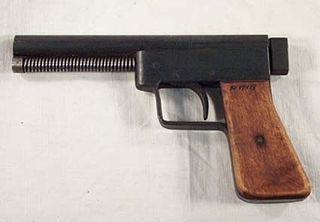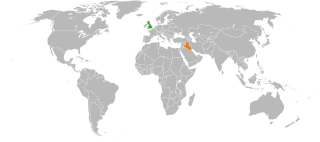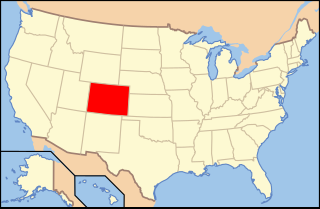Gun laws and policies, collectively referred to as firearms regulation or gun control, regulate the manufacture, sale, transfer, possession, modification, and use of small arms by civilians. Laws of some countries may afford civilians a right to keep and bear arms, and have more liberal gun laws than neighboring jurisdictions. Gun control typically restricts access to certain categories of firearms and limits the categories of persons who may be granted permission to access firearms. There may be separate licenses for hunting, sport shooting, self-defense, collecting, and concealed carry, each with different sets of requirements, privileges, and responsibilities.

Nuclear proliferation is the spread of nuclear weapons, fissionable material, and weapons-applicable nuclear technology and information to nations not recognized as "Nuclear Weapon States" by the Treaty on the Non-Proliferation of Nuclear Weapons, commonly known as the Non-Proliferation Treaty or NPT. Proliferation has been opposed by many nations with and without nuclear weapons, as governments fear that more countries with nuclear weapons will increase the possibility of nuclear warfare, de-stabilize international or regional relations, or infringe upon the national sovereignty of nation states.

A weapon, arm, or armament is any implement or device that is used to deter, threaten, inflict physical damage, harm, or kill. Weapons are used to increase the efficacy and efficiency of activities such as hunting, crime, law enforcement, self-defense, warfare, or suicide. In a broader context, weapons may be construed to include anything used to gain a tactical, strategic, material, or mental advantage over an adversary or enemy target.

Arms trafficking or gunrunning is the illicit trade of contraband small arms, explosives, and ammunition, which constitutes part of a broad range of illegal activities often associated with transnational criminal organizations. The illegal trade of small arms, unlike other organized crime commodities, is more closely associated with exercising power in communities instead of achieving economic gain. Scholars estimate illegal arms transactions amount to over US$1 billion annually.
Various anti-spam techniques are used to prevent email spam.

In the United Kingdom, gun ownership is considered a privilege, not a right, and access by the general public to firearms is subject to strict control measures. Members of the public may own certain firearms for the purposes of sport shooting, recreation, hunting or occupational purposes, however, they must be properly licensed.

A sawed-off shotgun is a type of shotgun with a shorter gun barrel—typically under 18 inches (46 cm)—and often a pistol grip instead of a longer shoulder stock. Despite the colloquial term, barrels do not, strictly speaking, have to be shortened with a saw. Barrels can be manufactured at shorter lengths as an alternative to traditional, longer barrels. This makes them easier to transport and conceal due to their smaller profile and lighter weight. The design also makes the weapon more portable when maneuvering in confined spaces and for that reason law enforcement and military personnel find it useful in close-quarters combat scenarios. As a result of the shorter barrel length, any shotgun with a tubular magazine will have a reduction in its magazine capacity.
The small arms trade is the markets of both authorized and illicit small arms and light weapons (SALW), as well as their parts, accessories, and ammunition.

The arms industry, also known as the defense industry, military industry, or the arms trade, is a global industry which manufactures and sells weapons and other military technology to a variety of customers, including the armed forces of states and civilian individuals and organizations. Products of the arms industry include weapons, munitions, weapons platforms, communications systems, and other electronics, and related equipment. The arms industry also provides defense-related services, such as logistical and operational support. As a matter of policy, many governments of industrialized countries maintain or support a network of organizations, facilities, and resources to produce weapons and equipment for their military forces. This is often referred to as a defense industrial base. Entities involved in arms production for military purposes vary widely, and include private sector commercial firms, state-owned enterprises and public sector organizations, and scientific and academic institutions. Such entities perform a wide variety of functions, including research and development, engineering, production, and servicing of military material, equipment, and facilities. The weapons they produce are often made, maintained, and stored in arsenals.

A gunsmith is a person who repairs, modifies, designs, or builds guns. The occupation differs from an armorer, who usually replaces only worn parts in standard firearms. Gunsmiths do modifications and changes to a firearm that may require a very high level of craftsmanship, requiring the skills of a top-level machinist, a very skilled woodworker, and even an engineer. Gunsmiths perform factory-level repairs and renovations to restore well-used or deteriorated firearms to new condition. They may make alterations to adapt sporting guns to better fit the individual shooter that may require extensive modifications to the firearm's stocks and metal parts. Repairs and redesigns may require fabrication and fitting of unavailable parts and assemblies constructed by smiths themselves. Gunsmiths may also renew metal finishes or apply decorative carvings or engravings to guns. Many gun shops offer gunsmithing service on the premises.
A gunstock or often simply stock, the back portion of which is also known as a shoulder stock, a buttstock, or simply a butt, is a part of a long gun that provides structural support, to which the barrel, action, and firing mechanism are attached. The stock also provides a means for the shooter to firmly brace the gun and easily aim with stability by being held against the user's shoulder when shooting the gun, and helps to counter muzzle rise by transmitting recoil straight into the shooter's body.

The ArmaLite AR-7 Explorer is a semi-automatic firearm in .22 Long Rifle caliber, developed in 1959 from the AR-5 that was adopted by the U.S. Air Force as a pilot and aircrew survival weapon. The AR-7 was adopted and modified by the Israeli Air Force as an aircrew survival weapon in the 1980s.

Improvised firearms are firearms manufactured by an entity other than a registered firearms manufacturer or a gunsmith. Improvised firearms are typically constructed by adapting existing materials to the purpose. They range in quality, from crude weapons that are as much a danger to the user as the target, to high-quality arms produced by cottage industries using salvaged and repurposed materials.
In the United States, the right to keep and bear arms is modulated by a variety of state and federal statutes. These laws generally regulate the manufacture, trade, possession, transfer, record keeping, transport, and destruction of firearms, ammunition, and firearms accessories. They are enforced by state, local and the federal agencies which include the Bureau of Alcohol, Tobacco, Firearms and Explosives (ATF).
The gun laws of New Zealand are contained in the Arms Act 1983 statute, which includes multiple amendments including those that were passed subsequent to the 1990 Aramoana massacre and the 2019 Christchurch mosque shootings.

The United Kingdom supported Ba'athist Iraq as early as 1981 during the Iran–Iraq War by covertly providing military equipment and arms. Although officially neutral in the conflict, the United Kingdom made direct sales to both Iraq and Iran. With an embargo in effect various companies also supplied Iraq and Iran by shipping materials through third-party countries and from those countries to the belligerents. While some of this exporting was legal, permitted or tolerated by parliament, Iraqi clandestine procurement operations were especially active in Britain.
The following activities were or are supposed to have been carried out by the Central Intelligence Agency (CIA) in Peru.

The Arms Trade Treaty (ATT) is a multilateral treaty that regulates the international trade in conventional weapons.

Gun laws in Colorado regulate the sale, possession, and use of firearms and ammunition in the state of Colorado in the United States.

Weapons diversion is a situation in which weapons and ammunition are taken from their originally intended recipients. This can include equipment originally intended for use by the armed forces of one country being sold to a different country, but the most common cause of weapons diversion involves the capture of weapons during warfare. Weapons diversion can contribute to arms trafficking and other forms of organized crime.












